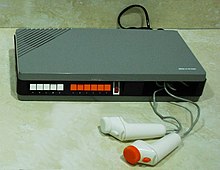Ping-O-Tronic
 A Zanussi Ping-O-Tronic with its two paddle-based game controllers | |
| Also known as | Zanussi Ping-O-Tronic Séleco Ping-O-Tronic |
|---|---|
| Manufacturer | Zanussi |
| Type | Dedicated home video game console |
| Generation | First generation |
| Release date | Late 1974 |
| Availability | Late 1974 |
| Lifespan | 1974-? |
| Introductory price | Estimated 70.000–130.000 Italian lira (Play-O-Tronic) |
| Units sold | c. 1 million with Play-O-Tronic (as of 1983) |
| Predecessor | None |
| Successor | Play-O-Tronic |
The Ping-O-Tronic (stylized on its logo as ping • o • tronic and also known as Zanussi Ping-O-Tronic or Sèleco Ping-O-Tronic) is a dedicated first-generation home video game console produced by Zanussi, an Italian home appliance company, and released under their Sèleco brand in late-1974 only in Italy.[1][2] It was the first Italian video game console, excluding Magnavox Odyssey imports and clones.[3]
Ping-O-Tronic came in an orange and white plastic container with a paddles housing. The control logic is based on three 7400 chips. Usable games are only three similar ones: Pong, Squash/Solo and Automatic/Attract.[3][4] The last one was the only game that did not require players and was used by stores to demonstrate the system without having anyone play it.[5]
There are several versions of the Ping-O-Tronic, marked by the abbreviations PP-1 up to PP-10. Starting from the PP-5, there was a new slot to which an optical gun could be connected to play a new aiming game. This accessory is called Gun-O-Tronic (stylized as gun • o • tronic).[3] The only other known consoles at the time which allowed the user to play aiming games were the Magnavox Odyssey and Philips Tele-Game ES 2201.[4]
On April 21, 1975, Zanussi obtained the license to implement Pong from Sanders Associates.[2]
Play-O-Tronic[edit]

In 1977, Zanussi produced and sold a new model of a Pong-like console called Play-O-Tronic (stylized as play • o • tronic and also known as Zanussi Play-O-Tronic or Sèleco Play-O-Tronic). Unlike the Ping-O-Tronic, which was built with discrete components, the Play-O-Tronic was built from a single AY-3-8500 chip.[4]
The console was also sold in Germany by German mailorder company Quelle, who sold the console under the name Universum TV Multi-Spiel (stylized as UNIVERSUM TV Multi-Spiel).[6][7][8] A built-in power supply comes with the Multi-Spiel.[6]
Sales[edit]
Zanussi was reported to have sold 21,514 units of the Play-O-Tronic from October 1, 1977 to December 31, 1977 and earned a total of 620,408,000 Italian lira (US$127,782,334), of which 5.5%, 34,122,440 lira (US$7,028,028) went to Sanders Associates.[2]
As of 1983, around 1 million units of both the Ping-O-Tronic and Play-O-Tronic have been sold.[9]
External links[edit]
- Play-O-Tronic on MobyGames
- Play-O-Tronic on pong-story.com
References[edit]
- ^ Tristan, Donovan (2010). "Hardware Glossary". Replay, The History Of Video Games. Lewes (Regno Unito): Yellow Ant. ISBN 978-0-9565072-2-8.
- ^ a b c "Zanussi - Ping-O-Tronic Advertisement". Pongmuseum.com. August 27, 2009. Archived from the original on April 27, 2014. Retrieved June 8, 2019.
- ^ a b c J. P. Wolf, Mark. The Video Game Explosion: A History from PONG to Playstation and Beyond.
- ^ a b c http://www.pong-story.com/zanussi.htm Dal sito pong-story
- ^ Baker, Kevin. The Ultimate Guide to Classic Game Consoles.
- ^ a b "Universum Multi-Spiel". Pong-picture-page.de. September 29, 2006. Archived from the original on September 7, 2012. Retrieved July 14, 2018.
- ^ "Universum TV Multi-Spiel [BINARIUM]". binarium.de. Retrieved 2020-07-07.
- ^ "Play-O-Tronic for Dedicated console (1977)". MobyGames. Retrieved 2020-07-07.
- ^ "Riapre Sèleco, e la tv torna a parlare l'italiano". Tom's Hardware (in Italian). August 1, 2017. Retrieved January 12, 2022.
